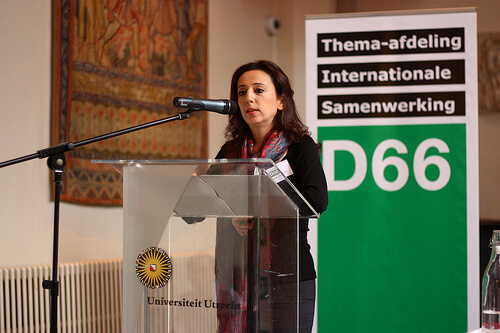By Ray Hanania

Rania Abouzeid was named as the recipient of the prestigious George Polk Awards in Journalism for 2014 in the category of Foreign Reporting for her feature published by Politico.com on the rise of ISIS, “The Jihad Next Door: The Syrian Roots of Iraq’s Civil War.”
Rania Abouzeid grew up in Australia and is the daughter of Lebanese immigrants. Fluent in Arabic, Rania Abouzeid has been published in TIME, the New Yorker, Foreign Affairs, Foreign Policy, Politico, The Guardian, the Los Angeles Times, The Australian, CSM, and a host of other outlets and have appeared on France 24 Television, BBC, CBC, CBS, PBS, Al-Jazeera, Channel 4 and others.
She has held several fellowships, including the Ochberg at Columbia University’s Graduate School of Journalism, and a visiting fellowship at the European Council on Foreign Relations.
Her website is www.RaniaAbouzeid.com.
Reporters who risked their lives in 2014 to cover the Ebola epidemic, traced the rise of the Islamic State, and revealed secret ransoms paid for the release of hostages are winners of Long Island University’s 66th annual George Polk Awards in Journalism. Additional honorees include reporters who uncovered systemic failure in two federal agencies, the Secret Service and the Veterans Administration, as well as journalists who exposed brutal treatment of prison and jail inmates.
Awardees will be honored at a ceremony at The Roosevelt Hotel in Manhattan on Friday, April 10.
“The excellent work across a variety of media platforms reflected by 558 nominations from news organizations, individual journalists, and members of our advisory panel suggests that journalists are adapting well to a landscape no longer dominated exclusively by print,” said John Darnton, curator of the awards.
The George Polk Awards are conferred annually to honor special achievement in journalism. The awards place a premium on investigative and enterprising reporting that gains attention and achieves results. They were established in 1949 by Long Island University (LIU) to commemorate George Polk, a CBS correspondent murdered in 1948 while covering the Greek civil war.
Reporting by the 2014 award recipients also laid blame for a deadly mudslide in Washington State on lax environmental enforcement, sparked the successful prosecution of a 10-year-old Chicago homicide by authorities reluctant to charge its well connected perpetrator, and connected the deaths of more than 300 domestic abuse victims in South Carolina and 400 migrants in Texas to inadequate laws, insufficient resources, and indifferent responses.
This is the 66th year of the prestigious journalism award honors.
Below are the winners of the 2014 George Polk Awards:
Garry Trudeau will be the 33rd recipient of the George Polk Career Award and is the first cartoonist in the program’s history to be so honored. He has cut political pretension down to the size of his Doonesbury comic strip for 45 years. Four other cartoonists—Jules Feiffer (1961), David Levine (1965), Jeff MacNelly (1977), and Edward Sorel (1980)—have also been cited for their work in specific years.
Trudeau, Feiffer, and Django Gold, senior writer for The Onion, will discuss the role and impact of comics and satire in journalism in light of the Paris terrorist attacks on Charlie Hebdo in early 2015 at the David J. Steinberg Seminar of the George Polk Awards, “Dangerous Lines: Cartoonists and Other Subversives.” The seminar takes place on Thursday, April 9, at LIU Brooklyn’s Kumble Theater for Performing Arts. The event is free and open to the public.
Rukmini Callimachi of The New York Times will receive the George Polk Award for International Reporting for an explosive account of how European nations secretly paid millions of dollars to ransom more than a dozen hostages held by the Islamic State. The kidnapping-for-ransom business model was perfected by Al-Qaeda, whose principal source of income is now from ransoms. Callimachi developed the story from documents she found in Timbuktu in 2013 while on assignment from the Associated Press, revealing a major schism between the policies of the United States and United Kingdom and the rest of Europe.

“Paying Ransoms, Europe Bankrolls Qaeda Terror”
Australian-Lebanese journalist Rania Abouzeid will receive the George Polk Award for Foreign Reporting for “The Jihad Next Door,” an extensive and authoritative account of the rise of the Islamic State, published online by Politico Magazine. Abouzeid gained access to Jihadist fighters and their leaders, showing how they used the conflict in Syria to gain strength and support, outflanking badly equipped and disorganized moderate rebels to form a powerful and more dangerous offshoot of Al-Qaeda.
“The Jihad Next Door: The Syrian Roots of Iraq’s Newest Civil War”
The George Polk Award for Health Reporting will go to Adam Nossiter, Norimitsu Onishi, Ben Solomon, Dr. Sheri Fink, Helene Cooper, and Daniel Berehulak of The New York Times, who risked their own health and safety to provide American readers with their earliest and most reliable coverage of the scourge of the Ebola virus in West Africa. Nossiter and Onishi are foreign correspondents with a combined nine years in West Africa; Solomon a videographer who had spent many months in Sierra Leone prior to the outbreak; Dr. Fink a physician who spent three weeks embedded in an Ebola treatment unit; Cooper a Liberian-American who normally covers the Pentagon; and Berehulak an Australian-born news photographer whose striking images enhanced the Times’ print and Web coverage.
“Dying of Ebola at the Hospital Door”
“How Ebola Roared Back”
Carol Leonnig of The Washington Post will be recognized with the George Polk Award for National Reporting for a series of exclusive reports on security lapses and misconduct at the U.S. Secret Service. Her reporting proved that the agency’s own accounts of incidents arising from carelessness and ineptitude were false and incomplete, leading to a complete overhaul of the Secret Service. Leonnig revealed that a White House intruder who scaled the fence was not stopped inside the door (as the official version had it) but well inside the main floor. She is one of three Post reporters honored a year ago for reporting on the scandal that enveloped former Virginia Governor Bob McDonnell.
“Secret Service Fumbled Response after Gunman Hit White House Residence in 2011”
“White House Fence-jumper Made it Far Deeper into Building than Previously Known”
The George Polk Award for Local Reporting will go to Tim Novak, Chris Fusco, and Carol Marin of The Chicago Sun-Times for dogged investigative reports in the face of considerable resistance by police and prosecutors over a 10-year-old homicide case involving a nephew of Richard M. Daley, the former Chicago mayor and Cook County state attorney. Their reporting reopened the case and led to a guilty plea by the former mayor’s nephew. A special prosecutor affirmed Sun-Times’ accounts that the killer had been shielded from prosecution in what amounted to an elaborate conspiracy.
“The Killing of David Koschman”
The George Polk Award for Business Reporting will recognize The International Consortium of Investigative Journalists, a group of 120 journalists from 58 countries and 42 news organizations, working as part of The Center for Public Integrity, for “Offshore Secrets,” which examined new ways that wealthy companies and individuals avoided taxes. A three-year investigation documented tax dodges at the expense of national treasuries and average taxpayers in the United States, China, and the European Union. The series demonstrated, among other revelations, how corporations like Pepsi, Disney, and FedEx used the tiny Grand Duchy of Luxembourg to stash cash and reduce global tax bills, how members of China’s wealthy elite hid their enormous fortunes, and how criminal enterprises used New York real estate to launder money.
“Leaked Documents Expose Global Companies’ Secret Tax Deals in Luxembourg”
“Hidden in Plain Sight: New York Just Another Island Haven”
The George Polk Award for Environmental Reporting will go to the staff of The Seattle Times for unearthing compelling evidence that the 43 deaths linked to a mudslide in rural Oso, Wash., were the result of corners cut, safeguards disregarded, and warnings ignored by lax state regulators. A geologist who saw disaster in the offing said he had protested but was no match for persistent corporate interests. “It’s David and Goliath,” he told a reporter, “but you don’t have the slingshot.”
“Oso neighborhood never should have been built”
“State used outdated data to allow logging on slope”
Julie K. Brown of The Miami Herald and two New York Times reporters, Michael Schwirtz and Michael Winerip, will share the George Polk Award for Justice Reporting for uncovering appalling evidence of guards brutalizing inmates at correction and detention facilities. The officers acted with impunity even when the abuse led to profound injury and death.
Brown found that a 50-year-old inmate who died in custody at the Dade Correctional Facility had been locked in a hot shower and scalded to death. Her reporting further established that police, prosecutors, and a medical examiner had abetted prison authorities in covering up that case and others across Florida. Top officials were replaced, dozens of guards were fired, fresh approaches to incarcerating the mentally ill have been undertaken, and criminal investigations are underway as a result of the reporting.
“Behind bars, a brutal and unexplained death”
“At a violent Florida prison, a death foreshadowed”
“For allegedly brutal prison guard, day of reckoning arrives”
Schwirtz and Winerip exposed a pattern of abuse of inmates—some beaten while they were handcuffed—in New York City’s jail complex on Rikers Island, using records and interviews to compile 129 instances of serious injury at the hands of frontline officers and supervisors in a single year. They reported that officials cleansed an audit of its most damning instances of brutality and curtailed other probes at the behest of an influential union chief who shut down the entire court transportation system one morning so an inmate scheduled to testify against officers could not appear. These and other revelations have spurred resignations, dismissals, new investigations, and a Justice Department lawsuit seeking to place city jails under federal oversight.
“Rikers: Where Mental Illness Meets Brutality in Jail”
“Report Found Distorted Data on Jail Fights at Rikers Island”
“At Rikers Island, Union Chief’s Clout is a Roadblock to Reform”
James Verini will receive the George Polk Award for Magazine Reporting for “Should the United Nations Wage War to Keep Peace?” This riveting and lavishly illustrated 11,000-word narrative appeared in the online version of The National Geographic. Verini spent a year exploring the seeming futility of U.N. intervention in the Democratic Republic of the Congo, a sprawling nation wracked by decades of civil war. He examined the implications of the U.N.’s decision to finally wage war against one of the largest and deadliest of the Congo’s rebel combatants, the M23 Militia.
“Should the United Nations Wage War to Keep Peace?”
The George Polk Award for Military Reporting will be awarded to Dennis Wagner of The Arizona Republic for coverage of allegations of misconduct in the Phoenix Veterans Administration health care system. His work inspired a VA physician to bring him evidence that administrators were under-reporting the wait time for care and pocketing bonuses based on the false data—a charade with deadly consequences since as many as 40 patients had died awaiting VA care in Phoenix. The paper delayed publication to protect its prime source, but when he retired and went before a Congressional committee, Wagner and the Republic were positioned to lead the way with a series of revelations. The articles evoked a national furor, forcing the resignation of VA Secretary Eric Shinseki, sparked an investigation of 90 other VA facilities, and inspired legislation to expand veterans’ access to timely treatment.
“VA in crisis: The Republic investigation”
Four reporters at The Post and Courier in Charleston, S.C.—Doug Pardue, Glenn Smith, Jennifer Berry Hawes, and Natalie Caula Hauff—will receive the George Polk Award for State Reporting for “Till Death Do Us Part,” a five-part series on the domestic abuse deaths of 300 women in the past decade—one every 12 days. They uncovered a culture of violence in South Carolina, where male abusers face a maximum of 30 days in jail for brutalizing a woman but up to five years in prison for cruelty to a dog. The state has 65 county animal shelters but just 18 safe houses for battered women. The Post and Courier’s reporting began after the Violence Police Center called South Carolina’s rate of male-on-female homicides the worst in the nation. Their work evoked a strong response from state political leaders vowing reforms. The Center for Investigative Reporting consulted on and provided funding for this project.
“Till Death Do Us Part”
Correspondent John Carlos Frey and executive producers Marisa Venegas and Solly Granatstein will receive the George Polk Award for Television Reporting for “Muriendo por Cruzar (Dying to Cross)” and “The Real Death Valley,” the Spanish and English versions of a joint investigation among Telemundo, The Weather Channel, and The Investigative Fund. Produced in collaboration with Efran Films, the programs explored the largely unreported plight of migrants in the harsh desert terrain of Brooks County, Texas, where more than 400 bodies have been found in the past five years. Local authorities noted that part of the problem was the U.S. Border Patrol’s failure to help because the county is 70 miles from the Mexican border.
“Muriendo por Cruzar (Dying to Cross)”
“The Real Death Valley”
The George Polk Award for Commentary will be presented to Ta-Nehisi Coates for “The Case for Reparations,” a provocative and well-documented essay published in the June 2014 issue of The Atlantic. Coates argued that the gap in wealth and opportunity between white and black Americans is primarily the result of centuries of racist public policy. “The popular mocking of reparations as a harebrained scheme authored by wild-eyed lefties and intellectually unserious black nationalists is fear masquerading as laughter,” he wrote. “Black nationalists have always perceived something unmentionable about America that integrationists dare not acknowledge—that white supremacy is not merely the work of hotheaded demagogues, or a matter of false consciousness, but a force so fundamental to America that it is difficult to imagine the country without it.”
The George Polk Career Award winner Garry Trudeau has come a long way since his undergraduate days at Yale. His depiction of quarterback Brian Dowling in the Yale Daily News led to a comic strip called Bull Tales, which morphed into Doonesbury, where B.D., Zonker Harris, Joanie Caucus, Rick Redfern, Mark Slackmeyer, Uncle Duke, and other regular characters could connect with barely disguised public figures (Vice President Dan Quayle was depicted as a feather) and others appearing in their own name. Henry Kissinger once remarked aboutDoonesbury, “The only thing worse than being in it would be not to be in it.”
“LIU is proud to honor excellence in investigative journalism that spans the globe with the George Polk Awards,” said Dr. Kimberly R. Cline, president of LIU. “This year’s winners are true heroes who risked their lives uncovering the truth behind some of 2014’s most incredible stories, and we salute their courage and determination.”


- Israelisnipers shooting and killing hospital workers in Gaza - December 11, 2023
- CAIR Condemns Israeli Executions of Wounded, Unarmed Palestinian in West Bank - December 11, 2023
- Arab and Muslim American voters face a “simple choice” between Biden’s inhumanity and Trump’s edgy politics - December 9, 2023





















